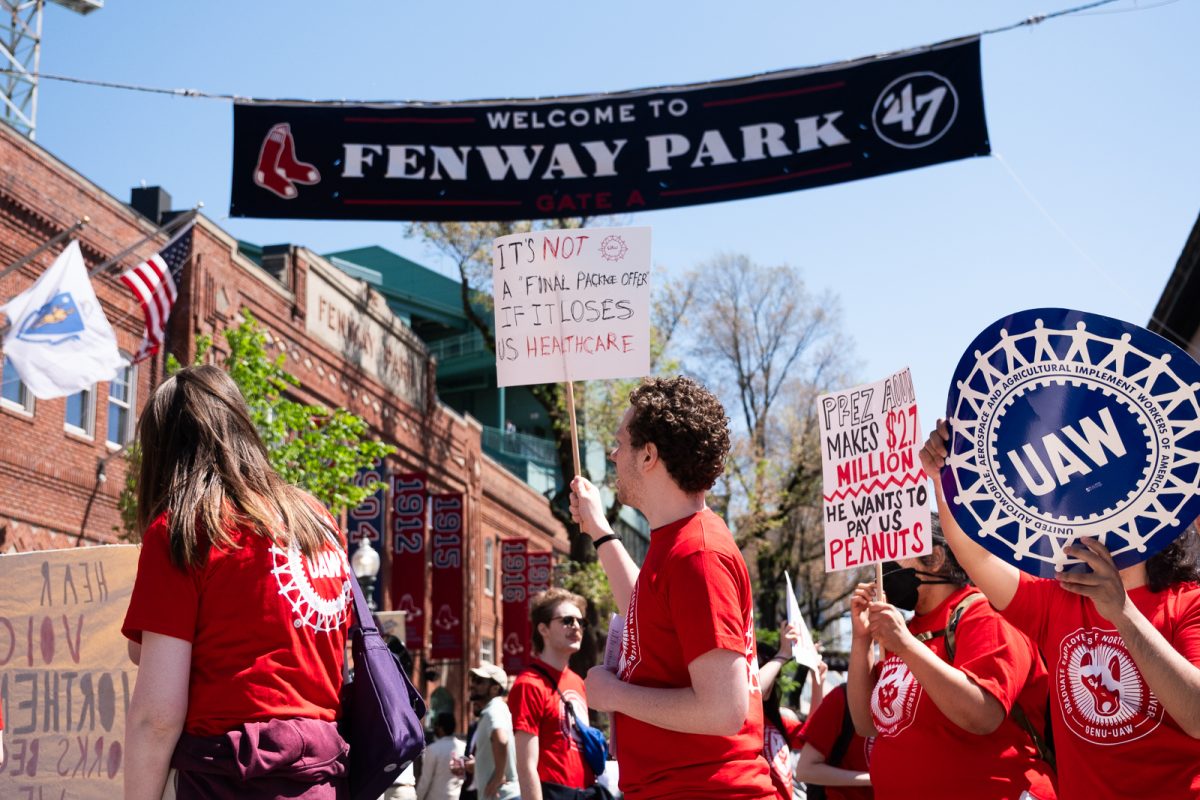Though her voice was raspy from over 16 hours of lobbying outside the Massachusetts State Courthouse the day before, Vicky Steinberg didn’t let that stop her from sharing her experiences with the students in Professor Eileen McDonagh’s gender and politics class Friday.
Steinberg was joined by Gavriel Wolfe to discuss with the class the issues revolving around the heated gay marriage debate on Beacon Hill. Lawmakers in the Statehouse passed three amendments Thursday that led them closer to a compromise that would allow for civil unions in Massachusetts, but not gay marriage.
Steinberg is a field member of MassEquality.org, an organization dedicated to defending the Massachusetts constitution and not only the rights of gays and lesbians, but also transgender, civil and women’s rights.
Wolfe is the public education director of the Gay and Lesbian Advocates and Defenders (GLAD) law firm – the same law firm that represented the plaintiffs in the historic Massachusetts Supreme Court case Goodridge v. Department of Public Health, in which a decision handed down on Nov. 18, 2003, allowed gay marriage to become legal in Massachusetts.
Both Steinberg and Wolfe have been heavily involved in the push to permanently make gay marriage legal in Mass-achusetts.
“My job outside the Statehouse [on Thursday] was to yell updates to the crowd about what was going on inside, which is why my voice sounds like this,” Steinberg said with a laugh. “It’s very technical, but very interesting what happens in there, and it’s important that people understand it.”
Steinberg and Wolfe took turns speaking to the class, giving background information on the Goodridge decision, explaining the actual meaning of the state’s syntax, discussing the differences between a civil union and marriage and revealing their hopes for the future of gay marriage.
“This idea of gay marriage is not a new idea – we just keep pushing it further,” Wolfe said. “There were 1,000 people out [at the Statehouse] yesterday to support equal rights for same sex couples – there were gays, lesbians, bisexuals, but also allies, like anti-defamation leagues and labor groups. There were a lot of different perspectives.”
Wolfe and Steinberg said they were optimistic the “compromise” amendment proposed by House Speaker Thomas Finneran banning gay marriage but allowing civil unions would be defeated.
“There are two opposite dynamics voting the same way on the issue – we realized when [the amendment] didn’t sail through the House that we had a serious chance of protecting these rights,” Steinberg said. “You’ve got the people that don’t even want gays to have civil unions, and then you’ve got the people who think civil unions aren’t enough and aren’t equal. Either way, they’re voting no, so there is a definite chance this amendment won’t go through.”
One student in the class said the visit from Wolfe and Steinberg presented new information that she could understand, rather than the confusing political jargon sometimes used by newspapers or television news anchors.
“I don’t know much about the politics of gay marriage, but [Steinberg and Wolfe] answered a lot of my questions,” said Stephanie Almon, a sophomore biology student in the class. “I didn’t understand any of the cases before, but I definitely agree with [Wolfe and Stein-berg’s] point of view … I don’t think it’s fair for anyone to be discriminated against, that’s preaching morals and it’s not fair.”
Almon also said having guest speakers come in provides a source of information and expertise on a specific subject a professor might not always have.
“I would definitely like to see more people like that come in. Professor McDonagh is so intelligent and insightful, but having speakers come in opens up a lot of doorways to other people who know a lot about an issue – it was awesome that she did that,” Almon said.
Steinberg said the fight for gay marriage has progressed, and will continue to grow in the future in a culture that is becoming more accepting of alternative sexuality.
“What wasn’t true 10 years ago is that now almost every legislator or public officiate knows someone who is affected by these laws – family, neighbors, work colleagues, even other openly gay legislators,” Stein-berg said. “They have to look their colleagues in the eye and take away their rights. It makes it a little harder, I hope. In the end, you cannot stop people from fighting for their rights.”









